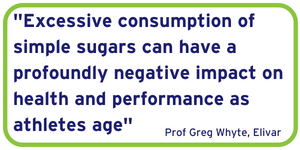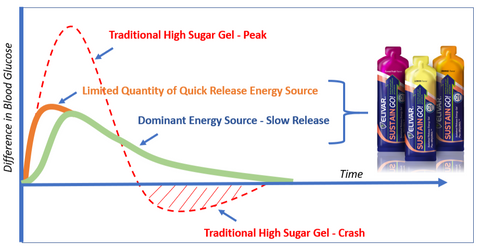How The Over 35s Should Use Complex Carbohydrates - Professor Greg Whyte

In this article two-time Olympian and Professor of Sports Science Greg Whyte explains why we should avoid excessive consumption of simple sugars, adapt a periodisation approach to our nutrition and focus on complex carbohydrates for improved performance and long term health benefits.
Sugar has recently become Public Enemy No.1. Whilst this could be seen as a media obsession to pin falling public health on a single source, there is some truth in the potentially harmful effects of excessive sugar consumption.
The deleterious effects of excessive sugar consumption impact on both health, including links to obesity and metabolic syndrome (increasing the risk of Type 2 diabetes & heart disease), and performance. In particular, excessive consumption of sugar (particularly simple sugars) can have a profoundly negative impact on health and performance as athletes age.
 Sugar is the generic name for sweet-tasting, soluble carbohydrates, many of which are used in food. There are various types of sugar derived from different sources. Simple sugars are called monosaccharides and include glucose, fructose, and galactose.
Sugar is the generic name for sweet-tasting, soluble carbohydrates, many of which are used in food. There are various types of sugar derived from different sources. Simple sugars are called monosaccharides and include glucose, fructose, and galactose.
Combining these simple sugars results in disaccharides (2 simple sugars i.e. sucrose which is granulated sugar; maltose from malted grain; and lactose from milk). Longer chains of sugars are called oligosaccharides or polysaccharides (also known as ‘Complex Carbohydrates’).
The longer the chain of simple sugars the longer they take to break down. Of note, sugars provide no nutrition with the exception of energy (why they are often called ‘empty calories’).
Whilst there is a growing trend for ‘Fat Adaptation’ in endurance and ultra-endurance sport care is warranted in adopting a low/no carbohydrate diet during heavy, intensive training and competition. Sugars are not essential in our diet however, high intensity exercise (above the anaerobic threshold) relies heavily on carbohydrates for energy production.
Accordingly, an athletes diet should reflect the demands of the upcoming training session/event to ensure optimal performance. Periodising your diet, in a similar fashion to periodised training, will provide the appropriate fuel for the task at hand. This approach is even more important for the older athlete, particularly in terms of sugar.
Biological and physiological changes as we age can lead to glucose intolerance; and insulin insensitivity. Furthermore, Type 2 diabetes is common in later life. Accordingly, the type, timing and volume of carbohydrate ingestion is important for the older athlete to avoid a range of common problems with excessive simple sugar consumption including: gastro-intestinal discomfort (i.e. bloating, nausea, diarrhea); poorly regulated blood glucose levels; and weight gain. Importantly, excessive simple sugar consumption can be deleterious to health as well as performance.
 Ensuring optimal energy availability is crucial for the older athlete however; the focus should be on complex (slower release) carbohydrates rather than simple (rapid release) sugars.
Ensuring optimal energy availability is crucial for the older athlete however; the focus should be on complex (slower release) carbohydrates rather than simple (rapid release) sugars.
Periodising nutrition to ensure adequate complex carbohydrate ingestion at meal times combined with targeted sports nutrition providing high quantities of complex carbohydrates, will help optimize training and competition performance whilst better protecting health.
Take Home Messages:
- Avoid excessive consumption of simple sugars
- Periodised Nutrition can significantly improve health and performance in older athletes
- Complex carbohydrates rather than simple sugars should be the aim for the older athlete.
About Elivar SUSTAIN PLUS and SUSTAIN GO!
Elivar’s SUSTAIN PLUS and SUSTAIN GO! products are formulated around Isomaltulose, a slow release carbohydrate which delivers energy over a sustained period. This fuels the body for longer without the sugar spikes and elevated insulin levels associated with traditional sports nutrition, while also avoiding the stomach distress including cramps and bloating that result from rapid-absorption of sugary products.

Professor Greg Whyte OBE PhD DSc FBASES FACSM
Prof Greg Whyte is a two-time Olympian, Professor of Sport Science, Liverpool John Moores University and has published over 200 peer reviewed papers and 8 books in the area of sport, exercise science and medicine . He is Performance Director, Centre for Health and Human Performance, Chair of UK Active Research Institute Scientific Advisory Board and Principal investigator for WADA. He has helped to raise over £35 million for Comic Relief and Sport Relief and is the best selling author of Achieve the Impossible.
Also in News

A Huge Thank You - A Message From Donal & Len
We are writing to let you know that today marks the beginning of our FINAL SALE at Elivar.
Since our founding in 2012, we’ve been driven by the belief that there’s a healthier way to approach sports nutrition for everyday athletes—those of us who exercise as part of a balanced, healthy lifestyle.
We created award-winning products that provided energy without the sugar rush typical of mainstream brands. Our unique blends were designed to support post-exercise recovery, especially as our bodies changed over time.

Elivar's Sustain Go! Energy Gels Fuelling BigFeat Events' Success
BigFeat Events, recognized for orchestrating captivating endurance events, stands out for its dynamic blend of cycling and running sportives. The recent "Beast to the East" cycling sportive, held on May 21st, is a sterling example of their commitment to crafting exhilarating experiences. A cornerstone of the success and popularity of these events has been the provision of Sustain Go! energy gels, generously sponsored by Elivar.
Previous running and events such as the "Bigwayround Trail Run" and "BigSea Trail Run" also benefited from the free distribution of Sustain Go! energy gels, much to the participants' delight. The energy boost and quicker recovery offered by these gels have consistently been instrumental in empowering athletes to perform their best.

NMN: Boosting Your Health from the Kitchen to the Medicine Cabinet
Did you know that Nicotinamide Mononucleotide (NMN), the star ingredient in numerous anti-aging supplements, also moonlights in several foods you might already enjoy? It's true! NMN is a vital precursor to NAD+, a molecule crucial to many biological processes, like cell growth, DNA repair, and metabolism. But as we age, NAD+ levels take a hit, and bolstering them through NMN intake can be beneficial. Now the question arises, can we simply count on our daily meals for our NMN fix?
